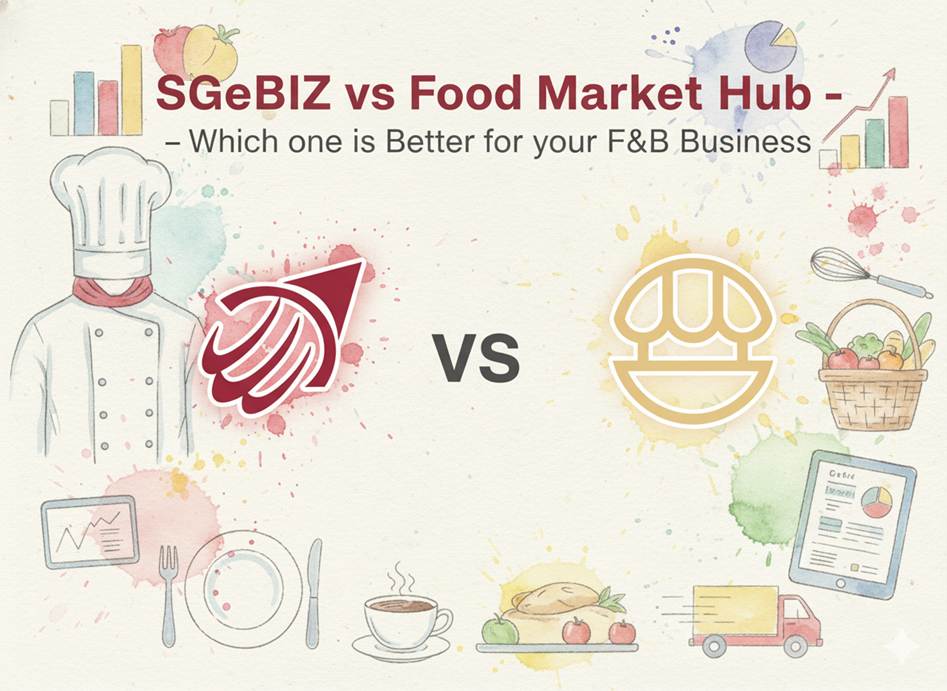Inventory Management Best Practices for Small Businesses: A Guide by Food Market Hub
.jpg)
Inventory management is a critical aspect of running a successful small restaurant business. Efficiently managing your stock ensures that you have the right products available to meet customer demand while avoiding overstocking or stockouts that can impact your bottom line. In this guide, brought to you by Food Market Hub, we'll explore inventory management best practices specifically tailored for small F&B businesses.
Why is Inventory Management Crucial for Small Businesses?
For small businesses, effective inventory management is essential for several reasons:
- Optimizing Cash Flow: Small businesses often have limited financial resources. Efficient inventory management helps ensure that your capital isn't tied up in excess stock.
- Customer Satisfaction: Consistently having products in stock leads to better customer satisfaction, as customers can rely on finding what they need when they visit your store.
- Cost Control: Overstocking can lead to storage costs, and stockouts can result in lost sales. Effective inventory management helps control these expenses.
- Business Growth: By minimizing inventory-related issues, you can focus on growing your business instead of dealing with stock-related headaches.
Inventory Management Best Practices for Small Businesses
1. Regularly Audit Your Inventory:
- Conduct frequent physical counts of your stock to ensure that your records match what's on your shelves.
2. Categorize Your Inventory:
- Implement an ABC analysis to categorize items based on their importance. Focus more attention on high-value items that have a significant impact on your revenue.
3. Set Reorder Points:
- Determine reorder points for each product to ensure that you reorder before running out. This helps prevent stockouts.
4. Embrace Technology:
- Invest in inventory management software that can streamline your processes, provide real-time data, and help with demand forecasting.
5. Supplier Relationship Management:
- Cultivate strong relationships with your suppliers. Open communication can lead to favorable terms, such as discounts or flexible payment options.
6. Safety Stock:
- Maintain a safety stock level for essential items to handle unexpected increases in demand or supplier delays.
7. Just-in-Time (JIT) Inventory:
- Implement JIT practices to order stock only as needed, reducing the risk of overstocking.
8. Regularly Review Your Inventory Mix:
- Keep an eye on your product offerings and discontinue items that aren't selling well.
Food Market Hub's Role in Inventory Management for Small Businesses
Food Market Hub understands the unique challenges faced by small businesses in managing their inventory. Our platform offers tailored solutions that can help you excel in inventory management:
- Streamlined Procurement: Food Market Hub automates the procurement process, from order creation to supplier communication, reducing manual work and ensuring you get what you need when you need it.
- Real-Time Inventory Tracking: Gain real-time visibility into your inventory levels, minimizing stockouts and overstock situations.
- Cost Control: Optimize inventory costs with data-driven insights and automated reorder points.
- Enhanced Customer Satisfaction: Consistently meet customer demands with accurate stock data, ensuring a seamless shopping experience.
Elevate Your Small Business with Effective Inventory Management
Effective inventory management is not just about having products on hand; it's about optimizing your resources and ensuring your small business thrives. By following these best practices and leveraging the solutions offered by Food Market Hub, you can elevate your inventory management game and set your small business on a path to success.
Effective inventory management isn't just a back-office task; it's a strategic decision that can shape the destiny of your small business. As you've discovered in this guide, managing your inventory effectively isn't just about keeping shelves stocked; it's about unlocking the full potential of your business.
- Optimising Your Resources: Small businesses, often operating with limited financial resources, need to make every penny count. Effective inventory management frees up capital that can be reinvested to spur growth, enhance marketing campaigns, or diversify your product range.
- Delighting Your Customers: Today's customers demand more than just products; they seek an experience. Having the right products in stock, consistently meeting their needs, and providing a seamless shopping experience can turn casual visitors into loyal patrons.
- Mastering Cost Control: Stocking excess inventory can lead to unforeseen expenses such as storage costs and losses from perishable items. On the flip side, stockouts result in missed sales opportunities. Embracing the best practices we've outlined helps you take control of these costs and drive profitability.
- Unleashing Your Business's Potential: With your inventory under control, imagine the possibilities for your small business. Focus on growth initiatives, explore new markets, or innovate within your industry – the choice is yours.
In conclusion, effective inventory management isn't just a task to check off your list; it's a strategy to transform your small business. By implementing the best practices we've discussed and harnessing the power of solutions like Food Market Hub, you're positioning your small business for success and growth in a competitive market. Now is the time to make your inventory work for you, uncover new growth opportunities, and deliver exceptional value to your customers.










